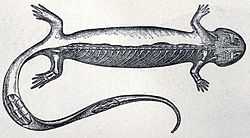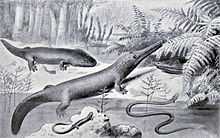Keraterpeton
| Keraterpeton Temporal range: Late Carboniferous | |
|---|---|
 | |
| Restoration | |
| Scientific classification | |
| Kingdom: | Animalia |
| Phylum: | Chordata |
| Class: | Amphibia |
| Subclass: | Lepospondyli |
| Order: | Nectridea |
| Family: | Keraterpetontidae |
| Genus: | Keraterpeton Etheridge, 1866 |
| Species | |
| |
Keraterpeton is an extinct genus of lepospondyl amphibian from the Carboniferous period of Europe and North America.

Restoration of Keraterpeton and other Permian amphibians by J. Smit
Keraterpeton was a salamander-like creature about 30 centimetres (12 in) long. Its tail was remarkably long taking up two thirds of the animal's total length, and was laterally flattened, presumably to aid in swimming. Its skull was round and short, especially when compared to its Permian relative, Diplocaulus. Its hind legs had five toes, and were longer than the forelimbs, which had only four toes.[1]
Although Keraterpeton had a long body, it did not have more vertebrae than most other amphibian species (15-26 on average).
References
| ||||||||||||||||||||||||||||||||